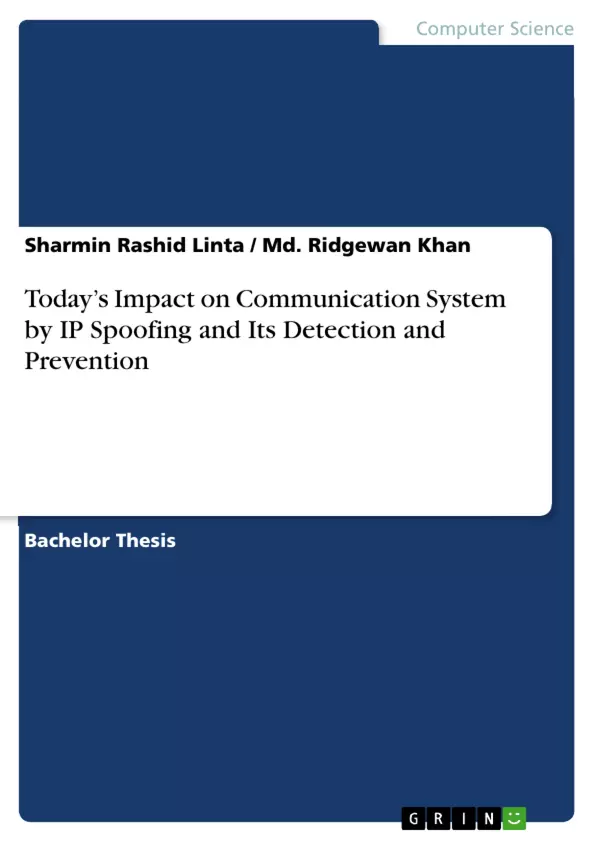In computer networking, the term IP address spoofing or IP spoofing refers to the creation of Internet Protocol (IP) packets with a forged source IP address, called spoofing, with the purpose of concealing the identity of the sender or impersonating another computing system. On January 22, 1995, in an article entitled, ―New form of attack on computers linked to Internet is uncovered‖, John Markoff of the New York Times reported on the TCP/IP protocol suite's security weakness known as IP spoofing. The IP spoofing security weakness was published by S. M. Bellovin (1989). However, not much attention has been paid to the security weaknesses of the TCP/IP protocol by the general public. This is changing as more people and companies are connecting to the Internet to conduct business. This thesis is on ―Today’s Impact on Communication System by IP Spoofing and Its Detection and Prevention‖. This paper contains an overview of IP address and IP Spoofing and its background. It also shortly discusses various types of IP Spoofing, how they attack on communication system. This paper also describes some methods to detection and prevention methods of IP spoofing and also describes impacts on communication system by IP Spoofing. We think that our proposed methods will be very helpful to detect and stop IP spoofing and give a secured communication system.
Table of Contents
- Chapter 1: Introduction
- 1.1 Background
- 1.2 Outline
- Chapter 2: Problem definitions & goals
- 2.1 Aims
- 2.2 Objectives
- 2.3 Research Plan
- Chapter 3: IP address & IP Spoofing
- 3.1 IP address
- 3.2 Brief History of IP Spoofing
- 3.3 Background
- 3.4 Recent Attacks using IP Spoofing
- 3.5 Details of an Attack
- 3.6 Why IP Spoofing is easy?
- 3.7 Application
- 3.8 Why spoofed IP address
- 3.9 Internet Protocol – IP
- 3.10 TCP/IP Overview
- 3.10.1 Ethernet
- 3.10.2 Internet Protocol
- 3.10.3 Transmission Control Protocol
- 3.10.4 User Datagram Protocol
- 3.10.5 Internet Control Message Protocol
- 3.11 IP Spoofing structure
- 3.12 IP spoofing and IPv6
Objectives and Key Themes
This thesis aims to explore the impact of IP spoofing on communication systems, focusing on its detection and prevention. The study examines the history, types, and mechanisms of IP spoofing attacks, analyzing its detrimental effects on network security and communication integrity.- Understanding the concept of IP spoofing and its history
- Examining the vulnerabilities of communication systems to IP spoofing attacks
- Analyzing various methods for detecting and preventing IP spoofing
- Exploring the impact of IP spoofing on communication system reliability and security
- Proposing strategies and techniques to enhance communication system security against IP spoofing
Chapter Summaries
- Chapter 1: Introduction - This chapter provides a brief background on IP spoofing, outlining the significance of the research topic. It also presents the structure and organization of the thesis.
- Chapter 2: Problem definitions & goals - This chapter elaborates on the research objectives, aims, and the overall plan for investigating IP spoofing and its impact on communication systems. It outlines the specific research questions and the methodologies employed in the study.
- Chapter 3: IP address & IP Spoofing - This chapter delves into the concept of IP addresses and the fundamental mechanisms of IP spoofing. It explores the historical development of IP spoofing, its practical applications, and the reasons for its prevalence. The chapter also provides a detailed overview of the TCP/IP protocol suite, emphasizing its vulnerabilities to IP spoofing attacks. It discusses the structure of IP spoofing and its implications in the context of IPv6, the latest version of the Internet Protocol.
Keywords
This thesis focuses on key terms and concepts related to IP spoofing and its impact on communication systems. The primary areas of focus include IP addresses, IP spoofing, TCP/IP protocol, network security, attack detection and prevention, and secure communication.Frequently Asked Questions
What is IP address spoofing?
IP spoofing refers to creating Internet Protocol packets with a forged source IP address to conceal the sender's identity or impersonate another system.
When was the security weakness of IP spoofing first uncovered?
The weakness was published by S. M. Bellovin in 1989 and gained major public attention after a New York Times report in 1995.
How does IP spoofing impact communication systems?
It compromises network security, allows for unauthorized access, and can be used in Distributed Denial of Service (DDoS) attacks to overwhelm systems.
Can IP spoofing be prevented in IPv6?
The thesis explores the implications of IP spoofing within the context of IPv6 and discusses modern prevention methods for current communication systems.
What are the common detection methods for IP spoofing?
Common methods include ingress and egress filtering, as well as analyzing TCP sequence numbers to identify forged packets.
- Citation du texte
- Sharmin Rashid Linta (Auteur), Md. Ridgewan Khan (Auteur), 2011, Today’s Impact on Communication System by IP Spoofing and Its Detection and Prevention, Munich, GRIN Verlag, https://www.grin.com/document/190620



